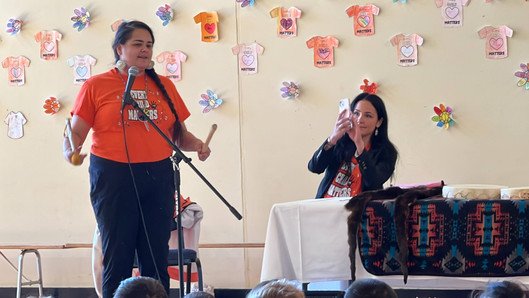Learning and Honoring Indigenous Culture at Kanata Montessori's Truth and Reconciliation Assembly
- Mickey Anderson
- Oct 11, 2023
- 2 min read
Kanata Montessori is constantly exploring ways to develop the minds of its students while also instilling a sense of respect and appreciation for the diversity that surrounds them. Last Thursday was a special day for the Montessori school and its extended family as it hosted an assembly led by Rae-Anna Whiteduck, an Indigenous leader. The event aimed to educate students and teachers about the Truth and Reconciliation movement, which advocates for long-term healing and justice for Indigenous people. In this blog post, we'll highlight the significance of the event and how the school demonstrated its commitment to learning and honouring Indigenous cultures.

The two Truth and Reconciliation assemblies at Kanata Montessori were powerful presentations that involved traditional Indigenous cultural elements and dances. The event was held following the National Day for Truth and Reconciliation, also known as Orange Shirt Day, which recognizes and brings awareness to the Indian Residential Schooling system's impact on First Nations, Métis, and Inuit children and their families. The assembly also highlighted the importance of indigenous knowledge and the teachings that have often been overlooked or ignored in schools and society.

During the assembly, Whiteduck shared the history of residential schools and how they have affected Indigenous families for generations. She emphasized the importance of active participation in the ongoing process of reconciliation by recognizing the work that has been done and continuing on the journey with Indigenous peoples. Her important and impassioned speeches made a lasting impression on all those who were present.
The Kanata Montessori community worked to make the event as impactful as possible. The school decorated the campus buildings with orange ribbons and flags, an initiative coordinated by the school's Grade 6 and 7 classes. The community was also encouraged to wear orange in support of the Truth and Reconciliation movement. The younger students were given the chance to create art and learn about Indigenous culture, and the older students were offered educational workshops and discussions.
The school's participation in Truth and Reconciliation couldn't come at a better time. Schools around the world are increasingly recognizing the value of incorporating Indigenous cultures in their curriculum, ensuring that students can gain knowledge about the rich history and traditions of our country's Indigenous communities. At Kanata Montessori, this integration has been a staple of the school's academic system for over 40 years, continuously highlighting the importance of respect, critical thinking skills, high academic achievement, and an international perspective.
The Truth and Reconciliation assembly at Kanata Montessori served as an incredible example of the school's commitment to creating an inclusive academic environment. The event was a powerful presentation of cultural education, allowing students to learn and honour Indigenous cultures and recognize the difficult history of Indigenous people in Canada. Rae-Anna Whiteduck's speeches highlighted the importance of active participation in the Truth and Reconciliation movement, focusing on knowledge, respect, and moving forward together as a community. The school's involvement in the process only reminds us that education has the power to unite and transform communities for the better.




































































































































Comments